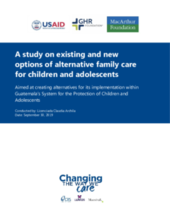Displaying 671 - 680 of 2221
This report from Changing the Way We Care reviews the range of available alternative care options in Guatemala and offers recommendations for additional alternative care modalities as well as deinstitutionalization and family preservation practices.
Spotlight: Child Welfare is a collaborative journalism project that aims to deepen and improve reporting on B.C.’s child-welfare system.
The objective of this study was to determine if Spanish foster care children and Spanish non-foster children differ on sluggish cognitive tempo (SCT), ADHD-inattention (IN), ADHD-hyperactivity/impulsivity (HI), oppositional defiant disorder (ODD), limited prosocial emotions (LPE), anxiety, depression, social and academic impairment measures and if the duration of foster care predicts a reduction in symptom and impairment differences between foster and non-foster care children.
This article summarises how genetically informed research designs can help disentangle genetic from environmental processes underlying psychopathology outcomes for children, and how this evidence can provide improved insights into the development of more effective preventive intervention targets for adoptive and foster families.
Looked after and adopted children are among the most vulnerable in our society and it is well established that they present with a higher prevalence of mental health problems than children who live with their birth family. This article presents a case study of a 15-year-old boy whose severe difficulties were understood and formulated in terms of ‘attachment problems’ for many years.
This article presents a case study of a 15-year-old boy whose severe difficulties were understood and formulated in terms of ‘attachment problems’ for many years.
The current study compares risk factors and sleep in a sample of foster care alumni and low-income young adults aged 18–24.
This qualitative study explored perspectives from young people with experience of OoHC in Melbourne, Australia regarding the promotion of mental health in OoHC. The study informed the subsequent development of a system-level intervention to support workers and carers in OoHC and evaluation of its implementation, the Ripple study.
Using a case study approach, this article will review a pre-college summer program designed specifically for youth transitioning from foster care, the National Social Work Enrichment Program (NSEP).
Abstract
Indigenous cultures have been under significant attack in Canada since first contact with Europeans. This has resulted in significant harm to Indigenous Peoples and particularly to youth in state care, who often struggle with their identity when they are placed in non-Indigenous out-of-home settings. Developing protective ways of countering this is compounded by the lack of understanding of identity development amongst Indigenous youth. This article reviews theories of Indigenous identity development and their implications for Indigenous children, particularly those caught in the nexus of two cultures, as is the case with those in state care.


